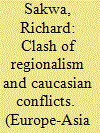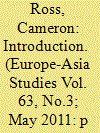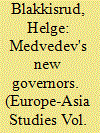|
|
|
Sort Order |
|
|
|
Items / Page
|
|
|
|
|
|
|
| Srl | Item |
| 1 |
ID:
104195


|
|
|
|
|
| Publication |
2011.
|
| Summary/Abstract |
THE RECOGNITION OF THE INDEPENDENCE OF Abkhaziya and South Ossetiya on 26
August 2008, following the five-day Russo-Georgian War (8-12 August), at a stroke
created a new dynamic in Russia's ethnic and federal relations and in the politics of the
Caucasus as a whole. Nation and state building aspirations were heightened across the
region. For the first time the independent political status of sub-national entities was
recognised in post-Soviet Eurasia, and this could come to threaten Russia itself. The
initial disintegration of Yugoslavia had occurred along the lines of the constituent
republics, but the recognition by the United States and some of its allies of Kosovo's
unilateral declaration of independence in February 2008 broke the unspoken taboo
against the recognition of sub-republican units that had governed processes of state
formation in the post-communist world (Pavkovic´ & Radan 2007, Chapter 5). The war
demonstrated that the process of the disintegration of the USSR was far from over,
but had only been 'frozen' for some two decades. Russia was now forced to deal with
Caucasian conflicts in a more fluid and broader international context, while
intensifying concerns about Russia's own territorial integrity. Although the threat
of outright separatism has waned, the adhesive bonds of the Caucasus with Russia
have also weakened (Malashenko 2009). The interconnectedness of the various
conflicts has now become evident (Cheterian 2008).
|
|
|
|
|
|
|
|
|
|
|
|
|
|
|
|
| 2 |
ID:
104185


|
|
|
|
|
| Publication |
2011.
|
| Summary/Abstract |
RUSSIAN ELECTORAL LEGISLATION IS BASED ON a Federal Law 'On the Basic
Guarantees of Electoral Rights and the Right of Russian Federation Citizens to
Participate in a Referendum',1 which provides a framework for all elections across the
country (hereafter, the Federal Law 'On the Basic Guarantees of Electoral Rights', or
the 'framework law'). This law takes priority over regional electoral legislation.
Therefore, ever since this framework legislation was first enacted in 1995, the
development dynamics of regional electoral legislation have been shaped by the
changes to this law. However, while in the past this framework law had only been
amended once or twice over a four-year election cycle, since 2004 it has been
continually amended (Lyubarev 2009a). Thus, for example, over the four years of its
mandate, the fourth State Duma of 2003-2007 amended the 'Law on the Basic
Guarantees' 17 times, whilst the fifth Duma amended it 14 times in its first two years
(2007-2009).
|
|
|
|
|
|
|
|
|
|
|
|
|
|
|
|
| 3 |
ID:
104198


|
|
|
|
|
| Publication |
2011.
|
| Summary/Abstract |
DID CHECHNYA CHECHENISE VLADIMIR PUTIN before Putin Chechenised Chechnya?
To what extent was Vladimir Putin's approach to the administration of Russia,
and particularly of the North Caucasus, influenced by crises that he faced during his
first formative months of power in 1999? Did the Kremlin's Chechenisation
programme become a template not only for the stabilisation of Chechnya, but for
the long-term administration of its North Caucasian neighbours, and finally for the
reconstitution of the Russian Federation? How have instabilities in the North
Caucasus been affected by the evolution of Russian federalism, and how have they
affected that evolution?
This article considers the extent to which instabilities in the North Caucasus and the
evolution of the Russian Federation have shaped each other reciprocally since 1999. It
suggests that Russia's federal recentralisation has inadvertently contributed to
regional problems of political corruption, political alienation, and Islamist extremism,
while these regional problems have contributed to authoritarian, bureaucratic, and
centralising trends in the Russian Federation. It proposes that Russians have fallen
into a vicious cycle of horizontal resistance and vertical reaction that may be as selfperpetuating
as it is self-defeating.
|
|
|
|
|
|
|
|
|
|
|
|
|
|
|
|
| 4 |
ID:
104175


|
|
|
|
|
| Publication |
2011.
|
| Summary/Abstract |
1The Russian Federation currently comprises 83 federal subjects (originally 89). These are divided into six sub-categories, three of which are based on different levels of ethnic autonomy (republics, autonomous okruga and one autonomous oblast') and three purely administrative categories (krai, oblasti and cities of federal importance). In this volume these entities will be referred to collectively as 'regions'.Putin became Russia's prime minister in August 1999, just one week after Chechnya-based militants invaded Dagestan, and his administrative style was cast in the opening months of the ensuing war. Second, shortly after his presidential inauguration in May 2000, Putin announced the reorganisation of the Russian Federation on the model of Russia's seven military districts. Third, on 13 September 2004-barely one week after the Beslan hostage crisis, and in explicit response to 'terrorist' threats-Putin announced the centralised appointment of Russia's regional governors, and an overhaul of the Russian electoral system that promised additional strength for the party of power. Fourth, in January 2010, President Dmitry Medvedev announced the formation of the North Caucasus Federal District with a focus upon the endemic problems of the region.
|
|
|
|
|
|
|
|
|
|
|
|
|
|
|
|
| 5 |
ID:
104200


|
|
|
|
|
| Publication |
2011.
|
| Summary/Abstract |
WHETHER OR NOT VLADIMIR PUTIN WAS AWARE OF Politkovskaya's observation,
let alone that made by the Ancient Greek playwright nearly two and a half millennia
earlier, the former Russian President appears to have been sufficiently politically astute
to have worked out for himself the importance of keeping happy Ramzan Kadyrov,
his young prote´ge´ in Chechnya, as the regional guarantor of territorial integrity and
relative stability.
Although this essay is primarily addressed to the 'special' relationship between
Putin's Russia and Kadyrov's Chechnya, its title reveals the difficult choices facing
Dmitry Medvedev, Putin's hand-picked successor as Russian President, and raises the
question of the extent to which he agrees with his predecessor and 'tandem' partner
over how to handle 'arguably the most powerful-and dangerous-regional leader in
the Russian Federation'.1 Does Medvedev regard this legacy as a possible template for
future Russian regional policy in the North Caucasus, does he fear that Kadyrov's
idiosyncratic style of rule might test this strategy to its limits, or does he recognise that
the spread of Islamic radicalism might be a result of Putin's misguided policies which
could, in the end, prove troublesome for Russian control over the entire region?
|
|
|
|
|
|
|
|
|
|
|
|
|
|
|
|
| 6 |
ID:
104189


|
|
|
|
|
| Publication |
2011.
|
| Summary/Abstract |
THE EMERGENCE OF LOCAL REGIMES,1
OR RELATIVELY stable patterns of subnational
governance, became an important logical consequence of the
turbulent political and economic changes in Russia's regions and cities during
the periods of the 1990s and the 2000s. We posit that these developments could be
analysed within the theoretical framework of 'urban regimes', which have been
conducted in studies of American and West European urban politics and
governance over the two last decades (Mossberger & Stoker 2001; Ledyaev
2008). Despite the major differences which exist between local regimes in
contemporary Russia and in the West, and their highly divergent political and
institutional environments, the placement of Russian local regimes within a
theoretical and comparative perspective opens new horizons for their analysis. It
also provides us with a better understanding of their general trends as well as some
of their peculiarities
|
|
|
|
|
|
|
|
|
|
|
|
|
|
|
|
| 7 |
ID:
104181


|
|
|
|
|
| Publication |
2011.
|
| Summary/Abstract |
On 7 May 2008, Dmitrii Medvedev was sworn in as the third President of the Russian Federation. Under his two predecessors, the relationship between Moscow and the regions had undergone cataclysmic changes. Boris Yel'tsin's rule had ushered in a period of unprecedented, albeit unsystematic and ad hoc, decentralisation (Teague 199458. Teague, E. 1994. "'Center-Periphery Relations in the Russian Federation'". In (1994) National Identity and Ethnicity in Russia and the New States of Eurasia , Edited by: Sporzluk, R. Armonk, NY: M.E. Sharpe.
|
|
|
|
|
|
|
|
|
|
|
|
|
|
|
|
| 8 |
ID:
104188


|
|
|
|
|
| Publication |
2011.
|
| Summary/Abstract |
IN THIS ESSAY I EXAMINE THE PROBLEMS OF institutionalising and nationalising
parties in Russia's regions and I trace the development of the party system from
the period of fragmentation and high levels of volatility under Yel'tsin, to the
monopolisation of power under Putin and Medvedev. In particular, I examine the
party saturation and non-saturation of regional assemblies.
|
|
|
|
|
|
|
|
|
|
|
|
|
|
|
|
| 9 |
ID:
104183


|
|
|
|
|
| Publication |
2011.
|
| Summary/Abstract |
THE TRANSFORMATION OF RUSSIA'S POLITICAL LIFE IN 2003-2007 was profound,
and it did not remain unnoticed by international democracy observers. Freedom
House downgraded Russia's status from 'partly free' in 2003 to 'not free' in 2007; the
Polity IV DEMOC score for Russia decreased from six in 2003 to five in 2007, which
corresponds with crossing a major dividing line between an imperfect democracy and
outright authoritarianism.1 From such scores, one might conclude, what we have
observed is a period of regime change. Indeed, several scholars and analysts have
invested their efforts into the study of a set of incentives and strategies that led
Russia's leadership to an abrupt authoritarian turn (Gill 2006; Hassner 2008; McFaul
& Stoner-Weiss 2008). What is often missing in such analyses, however, is the process
of transformation. Perhaps because they have concentrated on the national level of
politics, the students of regime change in Russia seem to have missed empirical
indicators that could have allowed them to trace the phases of transformation. As a
result, the picture becomes blurred: we have the relatively free 2003 Duma elections,
the obviously not-free 2007 Duma elections, and a black box in between.
|
|
|
|
|
|
|
|
|
|
|
|
|
|
|
|
|
|
|
|
|